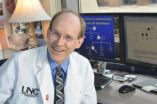(Press-News.org) Legal systems are necessary in any functioning society. Centuries ago, people realized that the only way to maintain a peaceful community was to develop a firm set of rules—laws—to punish transgressors. As laws have continued to evolve in societies around the world, psychological scientists have begun to investigate the psychological basis of many aspects of legal systems. A new special issue of Current Directions in Psychological Science, a journal of the Association for Psychological Science, presents the current state of research on psychology and law.
Many lawyers rely on eyewitness identifications and expert testimony in the courtroom, but scientific research increasingly suggests that this evidence is often unreliable. Eyewitnesses may be influenced by a suspect's race and by feedback from law enforcement officers. Expert testimony may be similarly flawed. Studies have shown that experts are often biased to the side that requested their assistance and even when expert testimony is truly objective, the judge—who is also susceptible to bias—often has the final say in determining which testimony is admissible in a trial.
Successful interviews of witnesses and suspects are critical for an effective legal system. However, false confessions may result when police officers present fabricated evidence and lie to suspects—a strategy known as the Reid technique. Psychological scientists have investigated alternative methods; for example, research suggests that false confessions may be reduced by the PEACE model, a method commonly used by officers in the United Kingdom which does not allow officers to misinform a suspect.
Aside from judges, juries play a key role in a number of legal systems around the world. Although all jurors enter the courtroom with some sort of implicit bias, research shows that juries are largely effective at considering evidence presented to them and applying the law.
While no legal system is perfect, scientific research may increase our understanding of the psychological underpinnings of suspect interviews, jury selection, and judges' decisions and thus help ensure that legal systems evolve in the most efficient direction.
###
To learn more about the psychology of law, see the February 2011 special issue of Current Directions in Psychological Science: http://cdp.sagepub.com/content/current
Current Directions in Psychological Science, a journal of the Association for Psychological Science, publishes concise reviews on the latest advances in theory and research spanning all of scientific psychology and its applications. For access to this special issue and other Current Directions in Psychological Science research findings, please contact Keri Chiodo at 202-293-9300 or kchiodo@psychologicalscience.org.
Psychology and the law: A special issue of Current Directions in Psychological Science
2011-02-18
ELSE PRESS RELEASES FROM THIS DATE:
Study suggests statins may prevent diabetic-related blindness
2011-02-18
Athens, Ga. – New University of Georgia research has found that a statin drug that is often known by the brand-name Lipitor may help prevent blindness in people with diabetes.
In a study using diabetic rats, lead author Azza El-Remessy, assistant professor in the University of Georgia College of Pharmacy, and her colleagues found that statins prevent free radicals in the retina from killing nerves important to maintaining vision. The results of the study are published in the March edition of the journal Diabetologia.
"The exciting part is that there are now treatment ...
The green machine: Algae clean wastewater, convert to biodiesel
2011-02-18
Let algae do the dirty work.
Researchers at Rochester Institute of Technology are developing biodiesel from microalgae grown in wastewater. The project is doubly "green" because algae consume nitrates and phosphates and reduce bacteria and toxins in the water. The end result: clean wastewater and stock for a promising biofuel.
The purified wastewater can be channeled back into receiving bodies of water at treatment plants, while the biodiesel can fuel buses, construction vehicles and farm equipment. Algae could replace diesel's telltale black puffs of exhaust with cleaner ...
Study reinforces link between obesity, high-fat meals and heart disease
2011-02-18
The effect of a high-fat meal on blood vessel walls can vary among individuals depending on factors such as their waist size and triglyceride levels, suggests new research at UC Davis.
The new research reinforces the link between belly fat, inflammation and thickening of the arterial linings that can lead to heart disease and strokes.
Triglycerides are types of fat molecules, commonly associated with "bad cholesterol," known to increase risk of inflammation of the endothelium, the layer of cells that lines arteries.
"The new study shows that eating a common fast food ...
Magma power for geothermal energy?
2011-02-18
When a team of scientists drilling near an Icelandic volcano hit magma in 2009, they had to abandon their planned experiments on geothermal energy. But the mishap could point the way to an alternative source of geothermal power.
"Because we drilled into magma, this borehole could now be a really high-quality geothermal well," said Peter Schiffmann, professor of geology at UC Davis and a member of the research team along with fellow UC Davis geology professor Robert Zierenberg and UC Davis graduate student Naomi Marks. The project was led by Wilfred Elders, a geology professor ...
The NIST role in role-based control: A 20th anniversary appraisal
2011-02-18
What NIST-led innovation is estimated to have saved U.S. industry $6.1 billion over the past 20 years? Well, probably several, but, perhaps surprisingly, a new economics study* points to the development of "role-based access control," a computer-security technology fostered and championed by the National Institute of Standards and Technology (NIST) in the 1990s.
Role-based access control (RBAC) is the idea of establishing standard levels of access—"permissions"— to the various computing resources and networks of an organization that are tailored to specific employee roles, ...
Compact high-temperature superconducting cables demonstrated at NIST
2011-02-18
A researcher at the National Institute of Standards and Technology (NIST) has invented a method of making high-temperature superconducting (HTS) cables that are thinner and more flexible than demonstration HTS cables now installed in the electric power grid while carrying the same or more current. The compact cables could be used in the electric grid as well as scientific and medical equipment and may enable HTS power transmission for military applications.
Described in a paper just published online,* the new method involves winding multiple HTS-coated conductors** around ...
Promise of genomics research needs a realistic view
2011-02-18
CHAPEL HILL, N.C. - In the ten years since the human genetic code was mapped, expectations among scientists, health care industry, policy makers, and the public have remained high concerning the promise of genomics research for improving health.
But a new commentary by four internationally prominent genetic medicine and bioethics experts cautions against the dangers of inflated expectations – an unsustainable genomic bubble – and it offers ways to avoid it while still realizing "the true – and considerable – promise of the genomic revolution."
"This commentary is ...
Technology breakthrough fuels laptops and phones, recharges scientist's 60-year career
2011-02-18
EAST LANSING, Mich. — How does a scientist fuel his enthusiasm for chemistry after 60 years?
By discovering a new energy source, of course.
This week, SiGNa Chemistry Inc. unveiled its new hydrogen cartridges, which provide energy to fuel cells designed to recharge cell phones, laptops and GPS units. The green power source is geared toward outdoor enthusiasts as well as residents of the Third World, where electricity in homes is considered a luxury.
"SiGNa has created an inherently-safe solution to produce electric power, resulting in an eco-friendly and cost-effective ...
Asthma tied to bacterial communities in the airway
2011-02-18
Asthma may have a surprising relationship with the composition of the species of bacteria that inhabit bronchial airways, a finding that could suggest new treatment or even potential cures for the common inflammatory disease, according to a new UCSF-led study.
Using new detection methods, researchers learned that the diversity of microbes inside the respiratory tract is far vaster than previously suspected – creating a complex and inter-connected microbial neighborhood that appears to be associated with asthma, and akin to what has also been found in inflammatory bowel ...
Mayo researchers, Rochester educators, students to present at science conference
2011-02-18
ROCHESTER, Minn. -- America's largest general science conference will be the setting next week for seven presentations on how zebrafish changed the classroom in Rochester. Those presenting at the conference in Washington, D.C., include researchers from Mayo Clinic and Winona State University, educators from the Rochester school system, and several students.
"We started out trying to improve how science was taught. That led to adding curriculum beyond science, and resulted in improvement in testing and grade outcomes, and now to the experience of reporting all of it at ...

